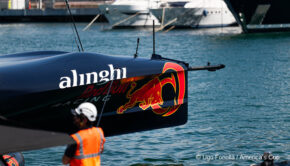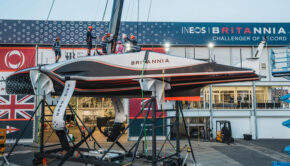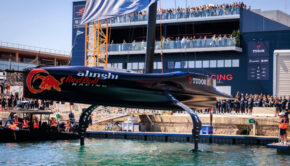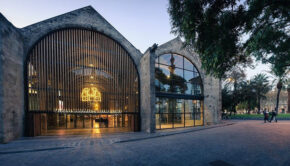Two Events – Extreme in their Own Way
Published on November 4th, 2013
Having just won the America’s Cup with Team Oracle USA, and having twice sailed in the Volvo Ocean Race, Antiguan Shannon Falcone discusses the differences and the similarities of both events….
What are the key differences between a global offshore challenge like the Volvo and a match-racing event like the Cup?
“The Volvo is an ultra-endurance race. It’s the Ironman of sailing! The nine months that you’re racing is a gradual decline of your physical and mental performances. Even if you don’t feel it, even if you think you’re just as good as you were at the start, you’re not.
“In the Cup for example, when you were training at max heart rate, we would make simple mental tests. We realised that at maximum physical exhaustion, the simplest mental puzzle becomes very complex. It doesn’t feel like it when you’re doing it, but if someone is filming you and you’re watching it back later, it’s crazy to see how much slower you become! We did that to study how to make split-second decisions on the racecourse at maximum exhaustion.
“The Volvo may follow a slower pace but the lack of sleep, the freeze-dried food and the fact that you’re in a black box with all your teammates for nine months affect your mental performances.
“In the Cup you’re pushing the boat hard and the risk is extremely high, but you do have a whole team behind you – on-the-water support and the guys back at the base. You push every day on the water knowing that you’ll have a chance to fix any problem during the night.
“On the Volvo boats, you’re far from any assistance and you really feel it. You need to back off. It’s such a long race that you’ve got to get to the finish. You do give everything because every boat length counts, but you also know that you need to always have something in the tank.
“And that’s true for both races – no matter what’s happening, you just have to keep sailing fast. Whether you’re two boat lengths behind or 200 miles behind, the game is still open until you cross the finish line.”
When are you the most tired then – after a long Volvo leg or a tough Cup day?
“I haven’t sailed the new Volvo Ocean 65 yet but I’m pretty sure the feeling after a leg won’t change – I felt like my body was destroyed. You pay a big price in the Volvo Ocean Race. In the Cup, you may be burning a lot of calories but you get a good recovery. It sounds like a prima donna comment but you get some good sleep, a lot of physical rehabilitation and a physiotherapist on a daily basis. In the Volvo, helmsmen and trimmers hold the wheel or ropes for hours and end up with big muscular issues. You get the same thing with grinding – I’m still working on scar tissue I developed during my first Volvo.
“But the satisfaction you get from the Volvo Ocean Race is very different from what you get from the America’s Cup. The Cup is a one-on-one fight; it’s you and your teammates against the other guys. The Volvo is a race against the other teams but primarily you’re racing against yourself. You’re out there in the ocean by yourself a lot of the time. It’s crazy when after two weeks at sea, you’re within a couple of boat lengths of your competitors, but a lot of the time you’re motivating yourself as a team and you’re making sure that everyone is always on it. To do the Volvo Ocean Race and to finish is, in itself, a great team accomplishment.”
Click here for full interview.









 We’ll keep your information safe.
We’ll keep your information safe.